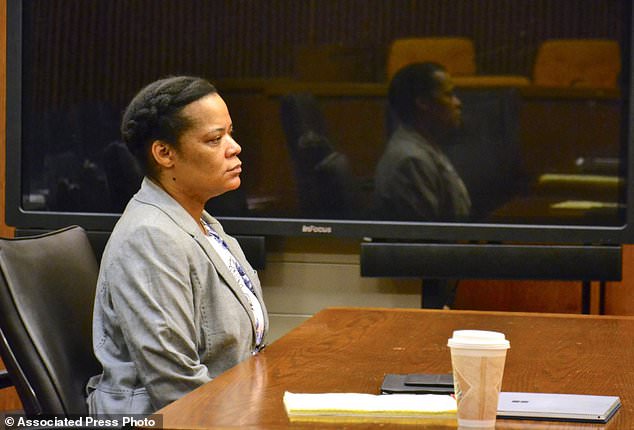
The Nigerian wife of a Cleveland firefighter was convicted Friday of soliciting his death to collect on insurance money,
Cleveland News reported.
The woman identified as Uloma Curry-Walker was found guilty of aggravated murder, conspiracy, felonious assault and other charges in the Nov. 3, 2013 slaying of her then-husband of four months, William Walker.
Before the sad incident, Friday would have been the couple’s 4-year anniversary.
According to the report, the guilty woman cried bitterly as she was being sentenced. Curry-Walker cried as the verdict was read and a Cuyahoga County sheriff’s deputy placed her in handcuffs. It was the first sign of emotion the 45-year-old showed throughout two weeks of testimony.
Jurors reached their verdict after deliberating for less than two hours.
Curry-Walker now faces a maximum of life in prison without the possibility of parole. Common Pleas Judge Sherrie Miday set Curry-Walker’s sentencing for Aug. 8.
Explaining how she was caught, Prosecutors said Curry-Walker had run tens of thousands of dollars into debt through credit cards and loans, some of which she had taken out in Walker’s name. As she sunk nearer and nearer to financial ruin, prosecutors said, she plotted Walker’s death to collect on his $100,000 life insurance policy.
Curry-Walker paid about a $1,000 down payment to her daughter’s boyfriend, Chad Padgett, who went to his cousin, Chris Hein. After an initial failed attempt at Walker’s life in October, Hein reached out to Ryan Dorty to carry out the killing.
All four, including Curry-Walker’s daughter, pleaded guilty, testified against her at trial and said the plot began with her.
Curry-Walker and Walker had just bought a house in Madison Township and were packing up their Lampson Road house to move the night he was killed.
Curry-Walker sent her husband out to get food from McDonald’s for her about 8:30, prosecutors said. Cellphone records show that she, her daughter and Hein placed several phone calls and text messages in the minutes leading up to the killing. Padgett and Dorty went with another man to the house and Dorty waited near the garage with a pistol that Hein had gotten.
When Walker came back home, Dorty ambushed him and shot him four times as he was unlocking the side door near the driveway. Walker’s keys were still in the door, prosecutors said.
Curry-Walker placed a frantic 911 call at 8:35 p.m. to report her husband had been shot in the driveway.
Her daughter, who was 17 years old at the time of the killing, testified that she was riding in a car with Curry-Walker and Padgett when her mother first brought up the plot.
Curry-Walker told Padgett to have the shooter pull Walker’s pocket out of his pants, to make the killing look like a botched robbery, the daughter testified.
The daughter also said her mother told her that “no one would believe I would hire a bunch of kids to kill someone when I know people that could.”
Curry-Walker showed no emotion as her daughter pinned the plot on her.
Assistant Cuyahoga County Prosecutor Blaise Thomas compared Curry-Walker’s conspiracy to a scene from the 1981 movie, “Body Heat”, in which a lawyer, played by William Hurt, hires an arsonist played by Mickey Rourke to help him commit the perfect murder and kill his girlfriend’s rich husband. Rourke’s character cautioned that there are 50 ways to screw up the perfect crime.
“If you think of 25 of them, you’re a genius,” he says. “And you ain’t no genius.”
What Curry-Walker didn’t realize, Thomas said, was that Walker had not finalized switching his life insurance policy into her name from the name of his ex-wife, who actually got the payout in the months after Walker’s death.
Curry-Walker ended up having to give away most of their belongings and moved to North Carolina to stay with a relative. Prosecutors hinged much of their case on Curry-Walker’s actions in the weeks and even seconds after Walker’s murder.
Thomas showed jurors a photograph of the blood-soaked white T-shirt that Walker was wearing when he was killed, and pointed out that a Cleveland firefighter who was one of the first emergency workers to get to the scene testified that Curry-Walker had no blood on her.
“Is it reasonable to expect that a loving wife is going to be there cradling her fatally shot husband?” Thomas asked.
Thomas had said in opening statements that Curry-Walker had left Walker’s ashes and other personal belongings in her car in Cleveland when she went to North Carolina. The car got repossessed and investigators found the box containing Walker’s ashes in the backseat. But trial testimony showed that Curry-Walker actually left the box in a drawer in an apartment, and her daughter’s father took the ashes into the car to turn them over to police.
Curry-Walker then watched as the dominos started to fall, Thomas said. First investigators arrested Dorty. Then as police closed in on the conspiracy, her own daughter flipped and agreed to testify against everyone, including her mother and Padgett, with whom she had an infant at the time.
Curry-Walker penned a confession letter the day before she turned herself in to police, in which she said she killed Walker because he was abusive.







